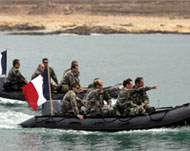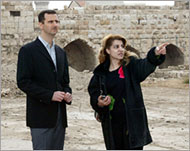UN: Security vacuum is a threat
The UN envoy to Lebanon has said that the security vacuum in the south of the country could endanger the week-old truce.

“The situation is still extremely fragile. Unintended incidents can kick off renewed violence, which might escalate and spin out of control,” Terje Roed-Larsen, a senior UN envoy, said in Jerusalem on Tuesday.
The UN is struggling to find 15,000 soldiers to maintain a truce in southern Lebanon after the 34-day war between Israel and Hezbollah.
No violations of the ceasefire were reported on Tuesday but many countries are unwilling to contribute troops for fear that they could be attacked by either Israel or Hezbollah.
France had initially said that it would offer thousands of troops and lead the mission. However, it then backed down and has since then offered only 200 extra troops to strengthen the existing UN Interim Force in Lebanon.
The French government has defended its decision and pointed out that only France has kept its promise to contribute peacekeeping troops by deploying 200 army engineers to southern Lebanon.
‘No reason to blush’
“If you look at the involvement of various countries in Unifil today, you will see that France has no reason to blush,” Denis Simonneau, spokesman for France’s foreign ministry, said on Tuesday.
In an attempt to solve the troop shortfall, Finland, holder of the revolving EU presidency, has called a meeting of the bloc’s foreign ministers on Friday in Brussels to discuss European contributions to the peacekeeping force.
 |
|
France has deployed 200 army |
European participation is seen as vital if the UN is to get an advance party of 3,500 troops on the ground by 2 September as planned.
Italy, one of the few European nations to have made significant troop pledges, has said that its deployment of 2,000-3,000 soldiers – about a third of the expected European contribution – is dependent on Israel respecting the truce.
“From Israel, we expect a renewed effort, this time truly binding, to respect the ceasefire,” Massimo D’Alema, foreign minister, told La Repubblica newspaper.
“It’s fair to expect that Hezbollah put down their weapons, but we cannot send our troops to Lebanon if the [Israeli] army keeps shooting.”
Israel has said that the peacekeeping force should also be stationed in Beirut’s international airport and at the Syrian border to ensure that Hezbollah cannot smuggle in more weapons.
Syrian objections
But Bashar Al-Assad, Syria’s president, reportedly said in an interview with Dubai Television to be aired on Wednesday that the stationing of UN troops on the Syrian border would be tantamount to “a withdrawal of Lebanese sovereignty and a hostile position”.
 |
|
Al-Assad is said to have objected |
Meanwhile, Jordan’s King Abdullah II, speaking from Islamabad where he met Pervez Musharraf, the Pakistani president, has called for the withdrawal of Israeli forces from Lebanon and urged countries to support Beirut in regaining full control over southern Lebanon.
“The recent crisis in Lebanon underscores the necessity of achieving a just, lasting and comprehensive resolution to the Palestinian-Israeli conflict,” Abdullah was quoted as saying by Pakistans official Associated Press of Pakistan news agency.
Abdullah said he hoped the international community would help the Lebanese government “in extending its sovereignty and its control over all of its borders by ensuring the withdrawal of Israeli forces from Lebanon and finding a comprehensive solution towards a permanent ceasefire”.